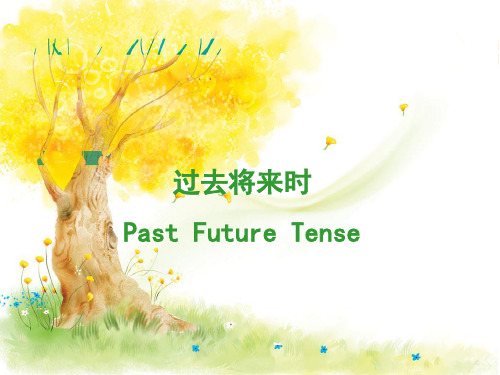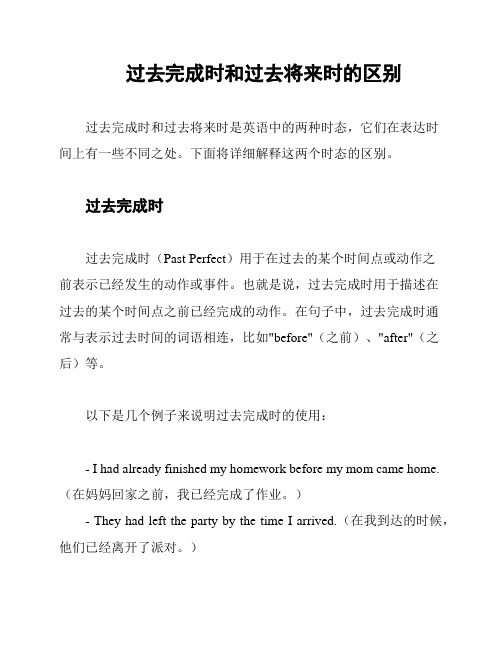过去将来时
时态 过去将来时

grow
C. will grow D. have grown
( C )5. She ______ to work when the telephone rang. A. is going C. was going B. will go D. is to go
II. 用所给动词的适当形式填空
would visit 1. Miss Zhang said she __________(visit) the Great Wall next summer. wouldn’t stay 2. She told him that she ___________(not stay) here for long.
析:过去将来时可以由“助动词should/would+ 动词原形”构成,但should一般只用于第一人 称。而would可用于各种人称。
I. 选择填空
( D )1. —What did your son say in the letter?
—He told me that he ______ the Disney World the next day. A. will visit B. has visited
过去将来时典型错误例析 1. 我们不知道他是否要在会上发言。 误:We didn’t know whether he is going to speak at the meeting. 正:We didn’t know whether he was going to speak at the meeting. 析:该句主句为过去时,且宾语从句表示从过去 某个时间看来将要发生的动作,所以从句要用过 去将来时态。
( B )3. Father said that he ______ me to Beijing the next year.
过去将来时

动词的时态(八)过去将来时过去将来时表示从过去的某一时间来看将来要发生的动作或存在的状态。
过去将来时常用于宾语从句中。
过去将来时的出发点是过去,即从过去某一时刻看以后要发生的动作或状态。
一.过去将来时的构成:would(should)+动词原形或was/ were going to+动词原形(注意:由助动词“would/should+动词原形”构成时,should主要用于主语是第一人称时;would可用于各种人称。
)I thought they would come to help me. 我认为他们会来帮我的。
He said he would wait for us at the bus stop. 他说他要在车站等我们。
二.过去将来时的用法(1)表示从过去某一时间点而言将要发生的动作或存在状态They said it would be fine. 听说天气会很好。
He said he would come. 他说他要来。
(2)表示过去的某种习惯行为She would lose the key! 她总是把钥匙弄丢了。
He would come to see us on Sundays. 过去星期天他经常来看望我们。
常见错误是:在条件状语从句和时间状语从句中忘记用一般过去时代替过去将来时.例:He said that he was going to the Great Wall if it wouldn't rain (rain) the next Saturday.答案:didn't rain解析:条件状语从句和时间状语从句中一般不用过去将来时,而常用一般过去时表示在过去看来将要发生的动作一.写出动词的正确形态1 I thought you _____________ the chance (take)2 He said he _________________ the next day(come back)3 They thought it ________________ to rain (be go)4 She said she _______________ the classroom after school。
过去将来时的用法和结构

过去将来时的用法和结构一、过去将来时的定义过去将来时是英语中的一种时态,用于表示过去某个时间点或某个过去的动作,但是与该时间点或动作相对应的将来发生的动作或状态。
二、过去将来时的结构过去将来时的结构由两个部分组成:助动词“would”和动词的原形。
肯定句结构:主语 + would + 动词原形例如:•I would go to the park tomorrow.(我明天会去公园。
)•She said she would call me later.(她说她会稍后给我打电话。
)否定句结构:主语 + would + not + 动词原形例如:•They would not come to the party last night.(他们昨晚不会来参加派对。
)•He said he would not tell anyone about it.(他说他不会告诉任何人。
)疑问句结构:Would + 主语 + 动词原形 + 其他?例如:•Would you like to have dinner with me?(你愿意和我一起吃晚饭吗?)•Would she go to the concert with us?(她会和我们一起去音乐会吗?)特殊疑问句结构:特殊疑问词 + would + 主语 + 动词原形 + 其他?例如:•When would you finish your homework?(你何时会完成作业?)•How would they solve the problem?(他们会如何解决这个问题?)三、过去将来时的用法过去将来时主要用于以下几个方面:1. 过去的计划或打算过去将来时可以用来表示过去某个时间点的计划或打算,这些计划或打算在过去的某个时间点是将来发生的。
例如:•We had already decided that we would go on a trip next month.(我们已经决定下个月去旅行。
过去将来时句子

过去将来时句子过去将来时是英语中的一种时态,用来表示过去某个时间点之前将会发生的动作或状态。
在语法上,过去将来时使用助动词“would”或“was/were going to”加上动词原形来构成。
在实际应用中,过去将来时常常用于虚拟语气或间接引语中,用来表示说话人过去对未来的预测、打算或假设。
在过去将来时句子中,主要使用“would”或“was/were going to”来表示将来的动作或状态,同时需要注意句子的逻辑关系和时态一致性。
下面将通过一些例句来详细说明过去将来时的用法。
1. 我们原本打算去海滩度假,但是天气预报说会下雨。
We were going to go to the beach for vacation, but the weather forecast said it would rain.2. 昨天我告诉他我会帮他搬家。
Yesterday I told him I would help him move.3. 他说他明天会去看电影。
He said he would go to see a movie tomorrow.4. 她说她会在晚上给我打电话。
She said she would call me in the evening.5. 昨天他告诉我他会来参加我的生日聚会。
Yesterday he told me he would come to my birthday party.6. 我们原本计划去爬山,但是天气不好。
We were going to go mountain climbing, but the weather was bad.7. 昨天他告诉我他会在下个月结婚。
Yesterday he told me he would get married next month.8. 我们原本打算去露营,但是取消了计划。
We were going to go camping, but the plan was cancelled.9. 她说她会在周末去购物。
过去完成时和过去将来时的区别

过去完成时和过去将来时的区别过去完成时和过去将来时是英语中的两种时态,它们在表达时间上有一些不同之处。
下面将详细解释这两个时态的区别。
过去完成时过去完成时(Past Perfect)用于在过去的某个时间点或动作之前表示已经发生的动作或事件。
也就是说,过去完成时用于描述在过去的某个时间点之前已经完成的动作。
在句子中,过去完成时通常与表示过去时间的词语相连,比如"before"(之前)、"after"(之后)等。
以下是几个例子来说明过去完成时的使用:- I had already finished my homework before my mom came home.(在妈妈回家之前,我已经完成了作业。
)- They had left the party by the time I arrived.(在我到达的时候,他们已经离开了派对。
)在上面的例子中,过去完成时用于表达在过去某个时间点之前已经完成的动作。
过去将来时过去将来时(Future-in-the-Past)用于在过去的某个时间点或动作之前表示将来的动作或事件。
也就是说,过去将来时用于描述在过去的某个时间点之前将要发生的动作。
在句子中,过去将来时通常与表示过去时间的词语相连,比如"before"(之前)、"after"(之后)等。
以下是几个例子来说明过去将来时的使用:- He said he would call me after he finished his work.(他说他会在他完成工作后给我打电话。
)在上面的例子中,过去将来时用于表示在过去某个时间点之前将要发生的动作或事件。
总结总的来说,过去完成时和过去将来时在表达时间上有所不同。
过去完成时用于描述在过去某个时间点之前已经完成的动作,而过去将来时用于描述在过去某个时间点之前将要发生的动作。
重要的是要记住这两个时态在时间顺序上的区别,以便在使用时更加准确和清晰。
过去将来时知识点总结

过去将来时知识点总结一、过去将来时概述过去将来时是表示在过去某一时间点或过去某一行为或状态之前将会发生的动作或状态的时态。
它在语法形式上以助动词would/did和动词原形构成,表示将来的动作或状态。
过去将来时在英语语法中属于较为复杂的时态之一,它的使用要视具体语境而定,因此需要进行深入的学习和研究。
二、构成1. 肯定句:主语 + would/did + 动词原形 + 其他。
例如:He said he would come to see us tomorrow.(他说他明天会来看我们。
)2. 否定句:主语 + would/did not + 动词原形 + 其他。
例如:She told us she wouldn’t be available next week.(她告诉我们她下周不会有空。
)3. 疑问句:Would/Did + 主语 + 动词原形 + 其他?例如:Would you help me carry these bags?(你能帮我拎这些包吗?)4. 特殊疑问句:特殊疑问词 + would/did + 主语 + 动词原形 + 其他?例如:When would they start the project?(他们什么时候会开始这个项目?)三、用法1. 表示过去的将来:过去将来时主要用于表示在过去某个时间点或某一行为或状态之前将会发生的动作或状态。
这种情况下,过去将来时往往与表示过去的时间状语连用,如yesterday, last night, last week等。
例如:He said he would visit his grandparents last Sunday.(他说他会上个星期天去看爷爷奶奶。
)2. 用于间接引语:在复合句中,当主句是过去时态的情况下,从句使用过去将来时,表示间接引语中的将来意义。
例如:She told me she would call me when she arrived.(她告诉我她到的时候会给我打电话。
一般过去将来时的结构及用法
一般过去将来时的结构及用法一般过去将来时是英语中一个比较复杂的时态,它用来表达在过去某个时间点以前、过去已经过去时所预期或计划发生的动作或状态。
本文将为您详细介绍一般过去将来时的结构及用法。
一、结构一般过去将来时构成如下:1. 肯定句:主语 + would / should / could + 动词原形+ 其他。
2. 否定句:主语 + would / should / could + not + 动词原形 + 其他。
3. 疑问句:would / should / could + 主语 + 动词原形 + 其他?二、用法一般过去将来时主要用于以下情况:1. 表示过去某个时间点以前打算或计划要做的事情。
例如:He said he would come to see me yesterday.(他说他昨天会来看我。
)2. 表示过去对可能出现的情况做出的预测或猜测。
例如:She said she would probably be late.(她说她可能会迟到。
)3. 表示邀请、请求、建议等含有礼貌委婉的语气。
例如:Would you please help me with the luggage?(你能帮我提这些行李吗?)4. 过去将来时也可以用在if条件句中,表示虚拟假设。
例如:If I had enough money,I would travel around the world.(如果我有足够的钱,我会环游世界。
)5. 过去将来时还可以用在宾语从句中,常常以that或者疑问词引导。
例如:He told me that he would come tomorrow.(他告诉我他明天会来。
)6. 过去将来时也可以用于表达好意的建议或劝告。
例如:You should visit your grandmother when you go back home.(回家时你应该去看望你的奶奶。
)三、一些需要注意的地方:1. 一般过去将来时中,动词本身不变,不受主语人称或数的变化。
过去将来时,过去完成时,现在完成时和一般过去式的区别
5. was / were +现在分词:表示在过去看来即将发生的动作。如: Jack said he was leaving tomorrow. 杰克说他打算明天动身。 She didn’t say whether she was coming to lunch. 她没有说她是否来吃午饭。 注意:并不是所有动词都具有这样的用法,通常可用于该句型中动词是come, go, leave, arrive, begin, start, stop, close, open, die, join, borrow, buy等瞬间动词。
3. was / were to + 动词原形:主要表示过去按计划或安排要做的事情。如: He asked where he was to put it. 他问他该把它放在哪里。 She said she was to get married next month. 她说她计划在下个月结婚。
4. was / were about to + 动词原形:表示在过去看来即将要发生的动作,由于本身已含有 “即将”的意味,所以不再表示具体的过去时间状语连用。如: I was about to go to bed when the phone rang. 电话铃响时我正好要上床睡。 I couldn’t go to Tom’s party as I was about to go into hospital. 我就要住院,所以不能 参加汤姆办的晚会了。
(2). 涉及将来时间的虚拟条件:即条件从句所涉及的内容是将来的不真实情况,或很 可能是将来的不真实情况,此时从句的谓语一般过去时(be通常用were),或用should+动 词原形,或用were to+动词原形,而主句谓语用“would+动词原形”(当然根据情况也 可用should, might, could)。如: If it rained tomorrow, we’d stay at home. 如果明天下雨,我们就待在家里。 If you took a taxi, you’d get there quicker. 如果你叫一辆出租汽车,你就会快点儿到那 儿。 第一句所表示的实际情况是:估计明天会天晴,所以我们侍在家里的可能性不大;第二 句所表示的实际情况是:你不愿叫出租车,所以你不能较快到达。 Exercise was leaving 1 She said the bus _____________(leave) at five the next morning.
高中语法过去将来时用法
高中语法过去将来时用法过去将来时(future perfect tense)用来表示过去其中一时间或动作之前将要完成的动作或状态。
下面是对过去将来时的用法进行详细的解释。
1. 结构:过去将来时的结构是由"would have + 过去分词"构成。
2. 肯定句形式:主语 + would have + 过去分词 + 其它成分。
例如:(她到达的时候我会已经完成作业。
)- They would have gone to the movie theater by now.(他们现在应该已经去电影院了。
)3. 否定句形式:主语 + would not have + 过去分词 + 其它成分,或者缩写形式:"主语 + wouldn't have + 过去分词 + 其它成分"。
例如:- She wouldn't have missed the bus if she had left earlier.(如果她早点出门就不会错过公交车了。
)- They would not have lost the game if they had trained harder.(如果他们训练更加努力,就不会输掉比赛。
)4. 疑问句形式:Would + 主语 + have + 过去分词 + 其它成分?例如:- Would you have bought the dress if it had been on sale?(如果裙子打折,你会买吗?)(如果他们有更多时间,他们会完成这个项目吗?)5.过去将来时的用法:-表示过去其中一时间之前将要完成的动作或状态:She would have arrived at the airport by 5 o'clock.(她会在5点之前到达机场。
)-表示过去其中一时间之前本应该完成但事实上未完成的动作或状态:They should have arrived by now.(他们现在应该已经到达了。
过去将来时概念
过去将来时1.定义: 过去将来时即一般过去将来时(一般过去将来时)。
一般过去将来时表示从过去的某一时间来看将来要发生的动作或存在的状态。
过去将来时常用于宾语从句和间接引语中。
一般过去将来时的出发点是过去,即从过去某一时刻看以后要发生的动作或状态。
2.结构:肯定句:主语+be(was,were)going to+动词原形主语+would(should would)+动词原形否定句:主语+be not(wasn‘t,weren’t)+动词原形+其它主语+would(should或could)not+动词原形+其它疑问句:Be(Was,Were)+主语+going to+动词原形+其它Would(Should could)+主语+动词原形+其它1.同一般将来时不一样,把系动词be变为过去式,把will,shall变为过去式。
例句:I didn't know if he would come.=I didn't know if he was going to come.我不知道他是否会来。
She was sixty-six. In three years,she would be sixty-nine.她66岁了。
三年后,她是69岁。
She told us that she would not go with us,if it rained.她告诉我们,如果下雨,她就不和我们一起去了。
I didn't know how to do it. What would be their ideas?我不知如何去做,他们会有什么想法呢?2.过去将来时常可用来表示过去习惯性的动作。
此时,不管什么人称,一律用would。
过去将来时有时可带时间状语注意1"was/were going to + 动词原形"或"was/were +动词不定式完成式"可表示未能实现的过去将来时间的动作。
- 1、下载文档前请自行甄别文档内容的完整性,平台不提供额外的编辑、内容补充、找答案等附加服务。
- 2、"仅部分预览"的文档,不可在线预览部分如存在完整性等问题,可反馈申请退款(可完整预览的文档不适用该条件!)。
- 3、如文档侵犯您的权益,请联系客服反馈,我们会尽快为您处理(人工客服工作时间:9:00-18:30)。
基本信息
过去将来时的构成(例句如下:)
肯定句:主语+be(was,were)going to+动词原形+其它
或:主语+would(should would)+动词原形+其它
否定句:主语+be not(wasn‘t,weren’t)以下六种时态考
察较少+动词原形+其他
或:主语+would(should或could)not+动词原形 +其它
疑问句:Be(Was,Were)+主语+going to+动词原形+其
它
或:Would(Should could)+主语+动词原形+其它
结构
1.同一般将来时不一样,把系动词be变为过去式,把will,
shall变为过去式。
例句:I didn't know if he would come.
=I didn't know if he was going to come.
我不知道他是否会来。
She was sixty-six. In three years,she would be
sixty-nine.
她66岁了。三年后,她是69岁。
She told us that she would not go with us,if it rained.
她告诉我们,如果下雨,她就不和我们一起去了。
I didn't know how to do it. What would be their ideas?
我不知如何去做,他们会有什么想法呢?
2.过去将来时常可用来表示过去习惯性的动作。此时,不管
什么人称,一律用would。
过去将来时有时可带时间状语
注意
1"was/were going to + 动词原形"或"was/were +动词不
定式完成式"可表示未能实现的过去将来时间的动作。
2was/were about to do
"was/were about to do"表示说话的瞬间就会发生的动作。
3was/were on the point of doing
提示"be about to do" 和 "be on the point of doing"结构
一般不与表示将来的时间状语连用,但后面可以接when引导的
分句。
标志词
一、"would+动词原形"表示过去将来时
"would+动词原形"构成过去将来时,常表示根据计划或安排
即将发生的事。
例1:He said he would come to see me.他说他要来看我。
例2:He told me he would go to Beijing.他告诉我他将去
北京。
二、"was /were+going to+动词原形"表示过去将来时
"was /were+going to+动词原形"也可表示根据计划或安排
即将发生的事。
例1:She said she was going to start at once.她说她将
立即出发。
例2:I was told that he was going to return home.他告
诉我他准备要回家。
"was /were+going to+动词原形"还可表示根据当时情况判
断有可能但不一定会发生某事。
例:It seemed as if it was going to rain.看来好像要下雨。
三、某些动词的过去进行时可表示过去将来时
come,go,leave,arrive,start等严格按照时间表发生的表起
止的动词可用过去进行时代替过去将来时。
例1:He said the train was leaving at six the next
morning.他说火车第二天早晨出发。
例2:She told me she was coming to see me.她告诉我她
要来看我。
四、特定场合的一般过去时可表示过去将来时
条件状语从句和时间状语从句中须用一般过去时代替过去将
来时。
例1:I didn't know when she would come, but when she
came I would let you know.我不知道她什么时候来,但她来了
我会告诉你。
析:第一个when引导宾语从句,可使用将来时,第二个when
引导时间状语从句,只能用一般过去时代替过去将来时。
例2:I didn't know if she would come,but if she came I
would let you know.我不知道她是否来,但如果她来我会告诉
你。
析:第一个if引导宾语从句,可使用将来时,第二个if引导
条件状语从句,只能用一般过去时代替过去将来时。
基本结构
过去将来时由would,was/were going to,was/were to,
was/were about to等加动词原形构成,也可由was/were on
the point of加动名词构成。[1]
例句
I knew you would agree. 我知道你会同意的。
I said I would arrange everything. 我说我来安排一切。
I didn't know if he would come. 我不知道他是否会来。
She was sixty-six. In three years,she would be
sixty-nine. 她66岁了。三年后,她是69岁。
I didn't know how to do it. What would be their ideas?
我不知如何去做,他们会有什么想法呢?
Last Sunday we were going to visit the Great Wall, but
it rained. 上星期天我们本想去游览长城的,但却下雨了。
I should be told about the thing.应该有人告诉我这件事。
Were they going to finish the work before the next day?
第二天他们能完成工作吗?
They were not going to go hiking unless they finished
their homework.除非他们完成作业,否则他们不会去远足。
